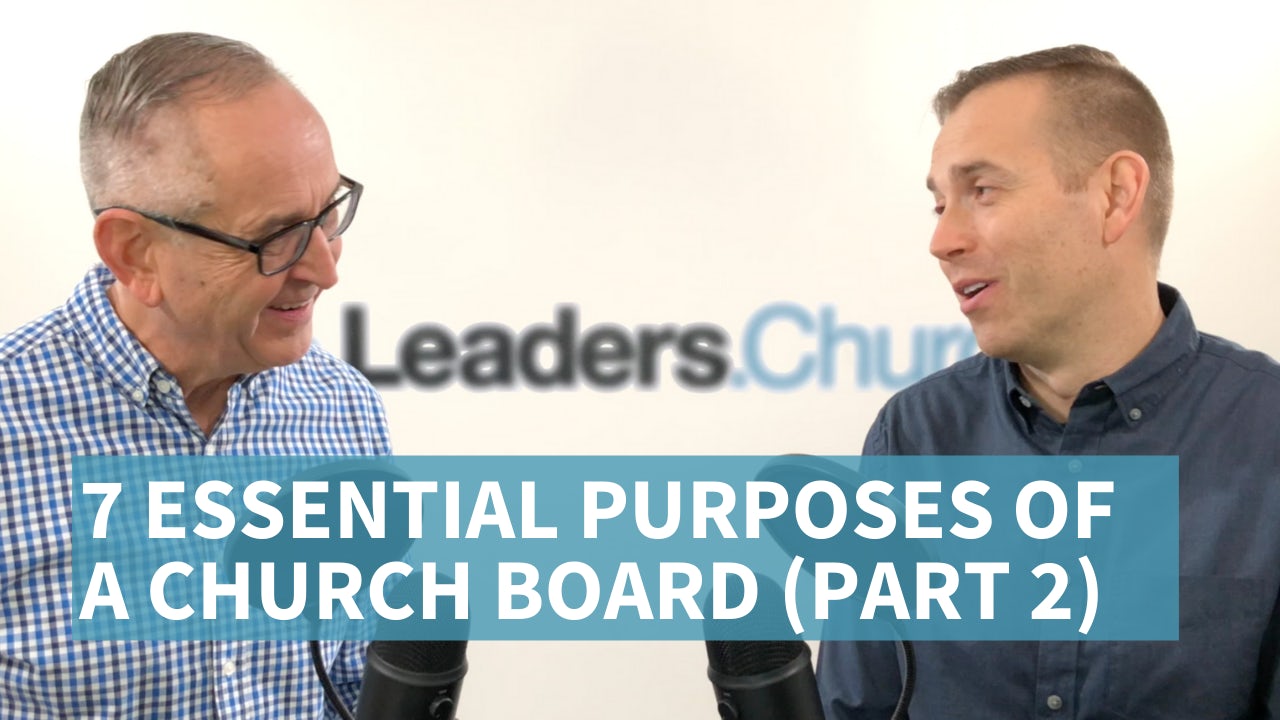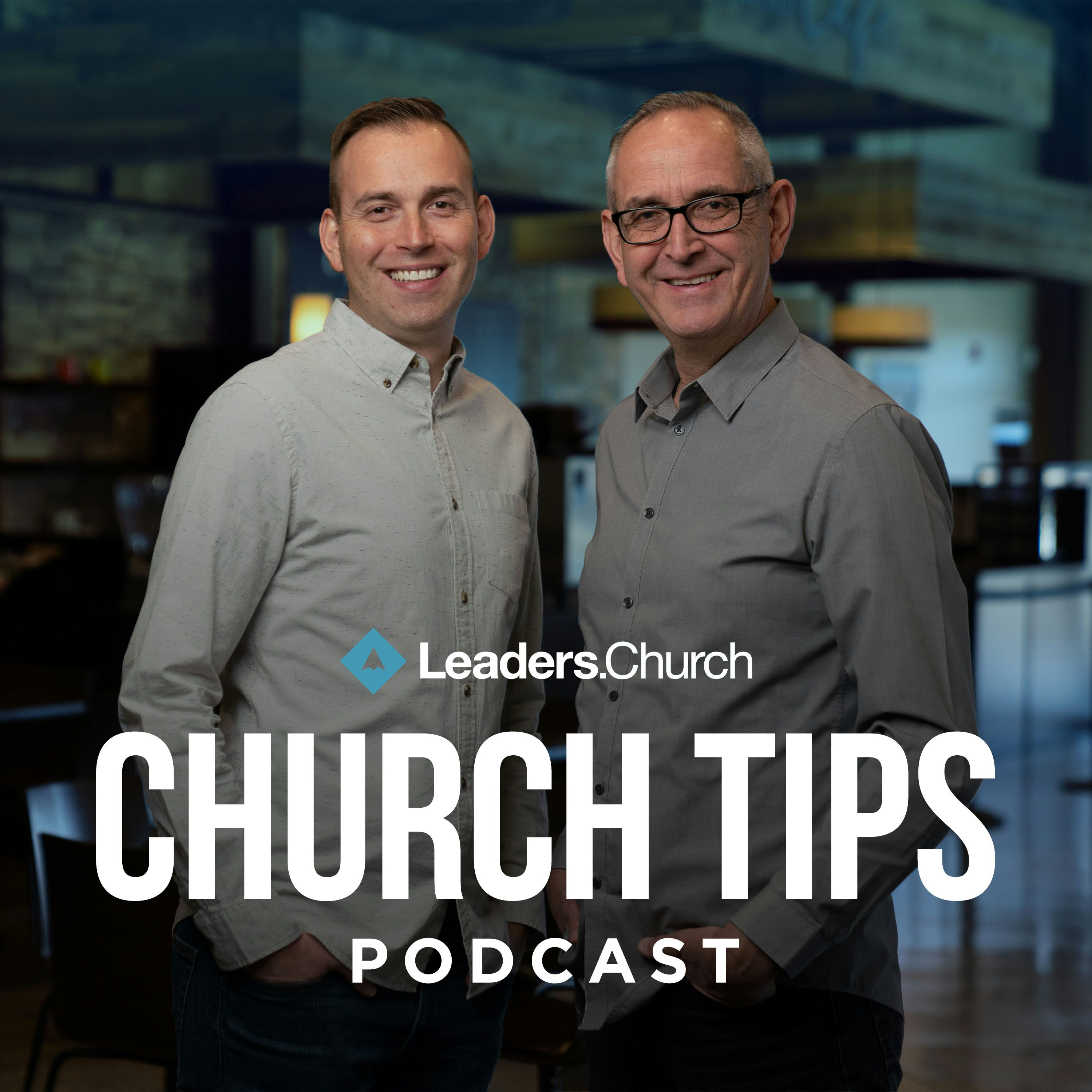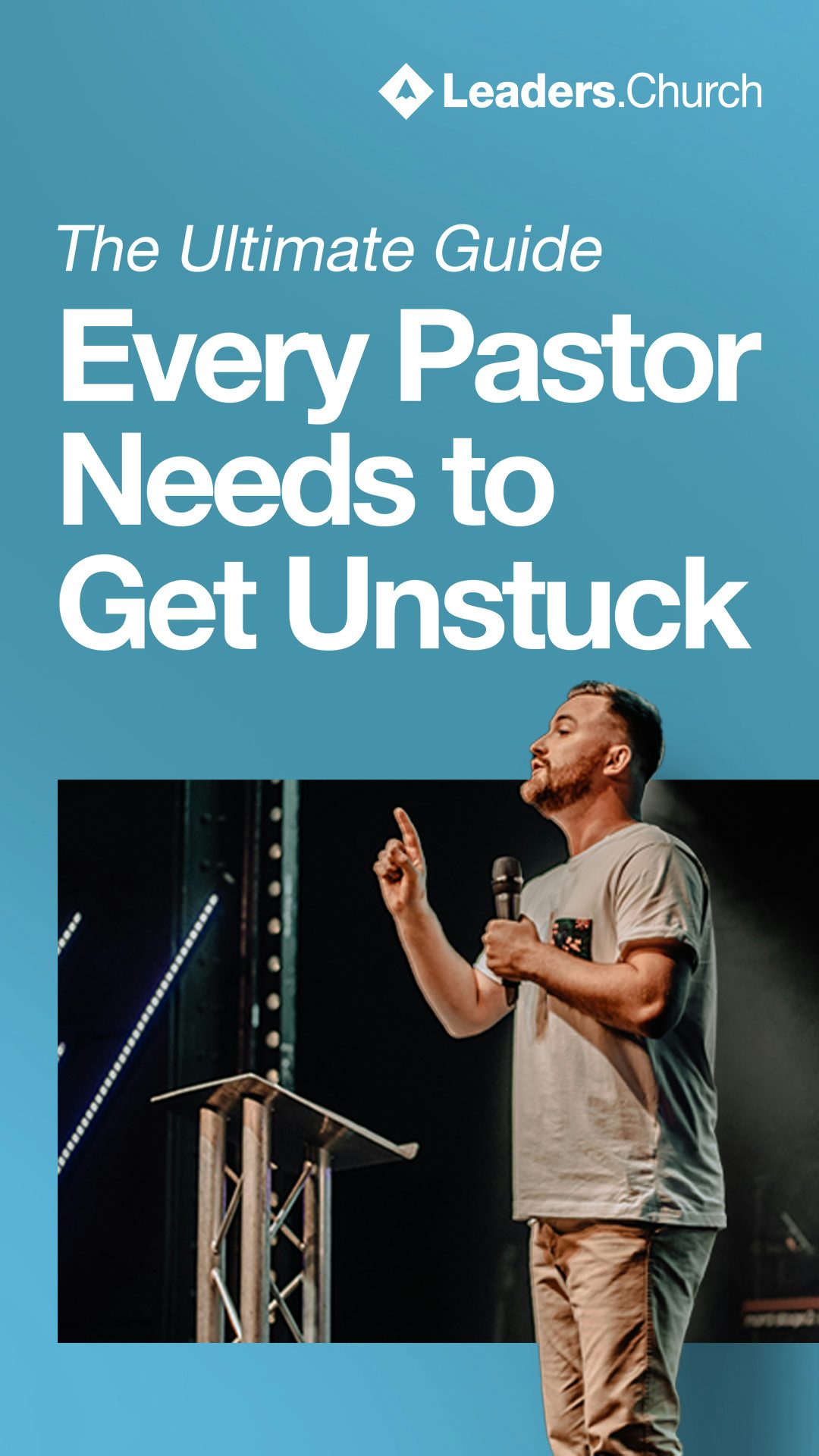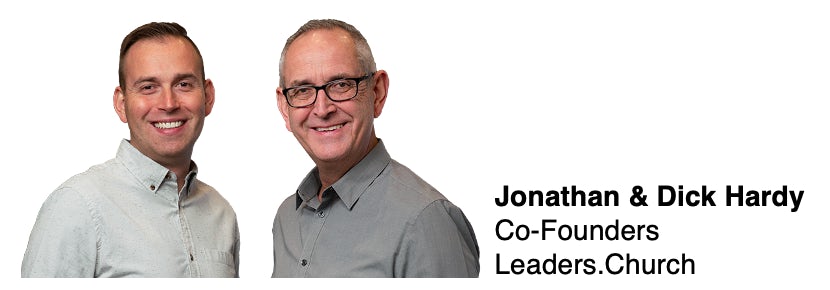019 – 7 Essential Purposes of a Church Board (Part 2)
What’s in this Episode?
Is having a church board really all that important? I mean, sometimes it seems like they just get in the way of making ministry happen. You know, if you’ve been wondering what the role and responsibility of a church board really is, you’re in luck, because today we’re going to continue from our last episode looking at the 7 essential purposes of a church board.
Read the Transcript
Dick Hardy 0:26
The other day, I was talking to a pastor, who’s a very successful pastor doing a great job, and a growing church and he told me, you know, these days, I really don’t need a board telling me what to do. Well, on one hand, I understood the context that he was talking about in terms the technical components of strategy and so on. On the other hand, I think he was putting his board in a box and missing an opportunity for board members to be able to speak into the pastor’s life. We talk about this in a lot of what we do here at Leaders.Church, and we certainly talked about it in the previous episode: Episode 18. But the church board has essential roles that they play to help a pastor fulfill the mission of the church. And that’s what we want to talk with you about today to continue the conversation that we had, in the previous episode, we’re going to talk about four more essentials that will help your board fundamentally fulfill their responsibilities. So Jonathan, get us started with us.
Purpose #4: Strategic Planning
Jonathan Hardy 1:31
Yeah, so the next purpose that a board needs to have or play in their role is strategic planning. And you know, one of the things that’s so important for churches to do is to strategically plan. This is basically where you’re thinking through future initiatives, you’re actually putting plans in place to execute whatever is coming up. And you know, some people are naturally gifted as planners. Other people are not gifted as planners as much, but it doesn’t matter how gifted or not gifted you are, you have to plan. And so that may mean you need to bring some people around you. The board can be those people where they come around, and they help in the planning. Here’s the reality, plans fail for lack of counsel, Proverbs 15, plans fail for lack of counsel, but with many advisors, they succeed and your church board can be that help for you. They can help be that advisory type group of people that will help in the planning of it. You have to make sure that you’re strategically planning and do that all the way through whatever events, opportunities, come your way. There’s just a variety of things you can do or need to be doing strategic planning for, but the point is one of the board’s purposes is to help you in the strategic planning process.
Purpose #5: Intentional Communication
Dick Hardy 2:43
Exactly, exactly. And the fifth one we want to talk to you about is intentional communication. I can’t tell you the number of times I’ve had a pastor tell me, “no, I’m not telling the board that. It’s none of their business.” Well, no, no, wait a minute. Listen. And your role as a leader is to open lines of communication all the time. I’m not suggesting, in fact they don’t. The board is not in a position to make decisions on things that you’re doing in the day to day basis. But you want them informed, smart, savvy pastors will continue to keep their board members informed. I know one pastor Jonathan, I both are familiar with that would have the department leaders or staff create a weekly report of what happened in their department. And he pulled all this together, and he’d send out the board members. Now, frankly, it was overkill. I mean, you know, because those board members weren’t able to read all this stuff. But the pastor was keeping them informed. And, there would never be a point where a board member said, “we never know what’s going on around here.” What you don’t want is board members out in the lobby and the church saying… and somebody says to them, “Hey, what about this?” “What about that?” And they say, “well, I don’t know!”
Dick Hardy 2:44
And they don’t have a good answer.
Dick Hardy 3:59
“Nobody tells me anything around here,” that is not going to help your church. Again, you’re not giving them permission to get their fingers in doing stuff and making decisions, but you’re informing them. Email, text, voice, verbal, keep people informed, intentional communication. Next one, Jonathan.
Purpose #6: Fiduciary Responsibility
Jonathan Hardy 4:20
Sixth purpose of the church board is fiduciary responsibility. Now this is a biggie. And super, super, very, super, very, super, super, very amazing. That’s right. No, this is so important because you have to make sure that you are responsible with your finances. And, you know, in a lot of contexts, the pastor is the one really driving the day to day and making those decisions. And the board is coming alongside for that support and accountability. You have to make sure that you have board members who understand finances and they know how to look at financial reports, they’re able to speak into that, and you allow them to speak into that from a financial standpoint, because the ultimate goal is for you to be balancing the budget, making sure that you have more income than expenses. And you don’t want more expenses happening and less income. Now, we talked about this actually, in episode number seven, where we talked about how to balance a church budget, make sure to check out episode seven if you have not yet done so. But the point is this, the board is there to give some accountability. They’re not necessarily there to control the finances. And I think that’s something that’s important to note. They’re there from an advisory standpoint, from a accountability standpoint, to make sure that everything’s looking good. And in line, income is more than expenses, but not necessarily coming in to say, “oh, well, I’m in charge of the finances, and this is how we’re going to do it and this is where we’re spending money and this is where we’re not spending money,” because what happens when board members do that, is they begin to cross over into the lane that’s not their lane. Dick talks about this at length in the Church Board Track, which is part of our online education through Church University. You can go to churchuniversity.com and check that out. In fact, we’ll give you, our listeners and viewers, a 50% off. So just go to churchuniversity.com and go to the Church Board Track and then type in “50off“, and all lowercase, and that gives you 50% off. The point is, though, he talks a lot about this in that course, where the pastor and board members can cross over into each other’s lanes, and that can be very sticky for pastors. And we got to make sure that pastors function and their role board members function and their role and one of those roles is related to the finances and who’s responsible to do what and so the point is simply this, one of their purposes is to help you in the fiduciary responsibility by maintaining accountability, but not control.
Dick Hardy 6:47
Not controlling. You’re not going to the board for, “hey, I want an extra 50 bucks for this.” And they say, “well, we’re only going to give you 20 bucks for this.” That’s not… you know, fiduciary responsibility is care and as Jonathan said, accountability, and both the pastor and the board work together to create the best fiduciary responsibility for the church.
Purpose #7: Document Curation
Dick Hardy 7:09
Okay, so the seventh and final essential is document curation. Now, this is not a term that we use in church a lot, but here is what document curation is: document curation is making sure the church’s records are in order. So what are we talking about? We’re talking about making sure your board minutes are in order, making sure anything that the state or the federal might require of a church or nonprofit are in order, that your forms are filled out. If you have employees, you’re turning in your 1099s, your W-2s, 1096s, W-3s, all this, the 941s are done in a proper way. It may mean you need to engage CPAs or accountants to do it and this doesn’t have to cost you an arm and a leg, but you better make sure all your i’s are dotted and t’s are crossed. That’s what document curation is, making sure your policies are in place. Even things like spiritual discipline that the church might need to exercise on a leader, with a leader, you want to be sure all those things are spelled out very clearly, you want to make sure your human resources or records are clear. And then obviously to the point Jonathan just made, that your financial records are in place. You want to exercise due diligence on all your documents. That’s an essential role of the church board and the board members can think, “oh jeepers.” Let me tell you, if you don’t do this, something goes sideways, you’ll wish you had. So that’s the seventh of the essentials. So what’s the flyover of this, Jonathan?
Dick Hardy 8:54
Yeah, so in essence, what we want to make sure you do is really help your board understand these purposes. So, if you have new board members coming on, you want to make sure you’re walking them through, here’s the purposes of the board, and that way they have a better understanding of it.
Recap:
Jonathan Hardy 9:09
So just to recap today, we talked about the final four of the seven. And the first was to strategically plan, second was intentional communication, third was fiduciary responsibility, and then the final one was document curation. One of the things I encourage you to do too, is if you are unsure of the roles, responsibilities of board members, or if you have board members who don’t necessarily know their roles and responsibilities, and you want to be able to help them in that, is to check out a free PDF we have for you. It’s called the “Leaders.Church 18 Rules of Engagement for Church Boards” and so you can access that at Leaders.Church/rules. Again, it’s called the 18 Rules of Engagement for Church Boards, go to Leaders.Church/rules, and you can sign up, get that free PDF, and it breaks down 18 roles and responsibilities for church board members. A lot of churches use it to train their their new board members or they use it just as refresher for the board members. We want to give that to you and make that available for you. And so be sure to check that out as well.
Jonathan Hardy 10:06
If you have not yet subscribed, please subscribe, hit the subscribe button here on YouTube. If you’re watching and if you’re listening on one of the podcast platforms, be sure to subscribe so that way you get more and more Church Tips in the weeks to come. And thank you so much for being with us today. We’ll look forward to seeing you next time. Take care and be blessed.
Subscribe & Follow:
- Subscribe on Apple Podcasts
- Follow on Spotify
- Subscribe to YouTube Channel
- Subscribe on Google Podcasts
- Like us on Facebook
- Follow us on Instagram
- Follow us on Twitter









